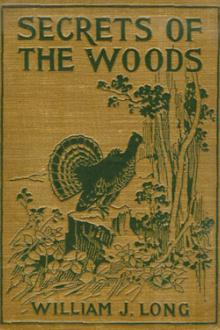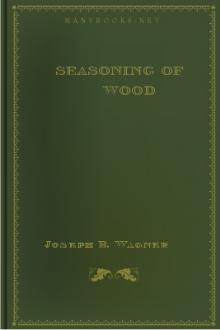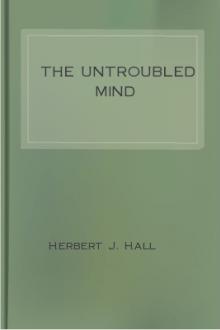Secret of the Woods by William J. Long (novels for students .TXT) 📕

- Author: William J. Long
- Performer: -
Book online «Secret of the Woods by William J. Long (novels for students .TXT) 📕». Author William J. Long
Once I heard a wounded bird give three or four beats of his drumcall, and when I went into the grapevine thicket, where he had fallen, I found him lying flat on his back, beating his sides with his wings.
Whenever he drums he first struts, because he knows not how many pairs of bright eyes are watching him shyly out of the coverts.
Once, when I had watched him strut and drum a few times, the leaves rustled, and two hen grouse emerged from opposite sides into the little opening where his log was. Then he strutted with greater vanity than before, while the two hen grouse went gliding about the place, searching for seeds apparently, but in reality watching his every movement out of their eye corners, and admiring him to his heart’s content.
In winter I used to follow his trail through the snow to find what he had been doing, and what he had found to eat in nature’s scarce time. His worst enemies, the man and his dog, were no longer to be feared, being restrained by law, and he roamed the woods with greater freedom than ever. He seemed to know that he was safe at this time, and more than once I trailed him up to his hiding and saw him whirr away through the open woods, sending down a shower of snow behind him, as if in that curious way to hide his line of flight from my eyes.
There were other enemies, however, whom no law restrained, save the universal wood-laws of fear and hunger. Often I found the trail of a fox crossing his in the snow; and once I followed a double trail, fox over grouse, for nearly half a mile. The fox had struck the trail late the previous afternoon, and followed it to a bullbrier thicket, in the midst of which was a great cedar in which the old beech partridge roosted. The fox went twice around the tree, halting and looking up, then went straight away to the swamp, as if he knew it was of no use to watch longer.
Rarely, when the snow was deep, I found the place where he, or some other grouse, went to sleep on the ground. He would plunge down from a tree into the soft snow, driving into it headfirst for three or four feet, then turn around and settle down in his white warm chamber for the night. I would find the small hole where he plunged in at evening, and near it the great hole where he burst out when the light waked him. Taking my direction from his wing prints in the snow, I would follow to find where he lit, and then trace him on his morning wanderings.
One would think that this might be a dangerous proceeding, sleeping on the ground with no protection but the snow, and a score of hungry enemies prowling about the woods; but the grouse knows well that when the storms are out his enemies stay close at home, not being able to see or smell, and therefore afraid each one of his own enemies. There is always a truce in the woods during a snowstorm; and that is the reason why a grouse goes to sleep in the snow only while the flakes are still falling. When the storm is over and the snow has settled a bit, the fox will be abroad again; and then the grouse sleeps in the evergreens.
Once, however, the old beech partridge miscalculated. The storm ceased early in the evening, and hunger drove the fox out on a night when, ordinarily, he would have stayed under cover.
Sometime about daybreak, before yet the light had penetrated to where the old beech partridge was sleeping, the fox found a hole in the snow, which told him that just in front of his hungry nose a grouse was hidden, all unconscious of danger. I found the spot, trailing the fox, a few hours later. How cautious he was! The sly trail was eloquent with hunger and anticipation. A few feet away from the promising hole he had stopped, looking keenly over the snow to find some suspicious roundness on the smooth surface. Ah!
there it was, just by the edge of a juniper thicket. He crouched down, stole forward, pushing a deep trail with his body, settled himself firmly and sprang. And there, just beside the hole his paws had made in the snow, was another hole where the grouse had burst out, scattering snow all over his enemy, who had miscalculated by a foot, and thundered away to the safety and shelter of the pines.
There was another enemy, who ought to have known better, following the old beech partridge all one early spring when snow was deep and food scarce. One day, in crossing the partridge’s southern range, I met a small boy,—a keen little fellow, with the instincts of a fox for hunting. He had always something interesting afoot,—minks, or muskrats, or a skunk, or a big owl,—so I hailed him with joy.
“Hello, Johnnie! what you after to-day—bears?”
But he only shook his head—a bit sheepishly, I thought—and talked of all things except the one that he was thinking about; and presently he vanished down the old road. One of his jacket pockets bulged more than the other, and I knew there was a trap in it.
Late that afternoon I crossed his trail and, having nothing more interesting to do, followed it. It led straight to the bullbrier thicket where the old beech partridge roosted. I had searched for it many times in vain before the fox led me to it; but Johnnie, in some of his prowlings, had found tracks and a feather or two under a cedar branch, and knew just what it meant. His trap was there, in the very spot where, the night before, the old beech partridge had stood when he jumped for the lowest limb. Corn was scattered liberally about, and a bluejay that had followed Johnnie was already fast in the trap, caught at the base of his bill just under the eyes. He had sprung the trap in pecking at some corn that was fastened cunningly to the pan by fine wire.
When I took the jay carefully from the trap he played possum, lying limp in my hand till my grip relaxed, when he flew to a branch over my head, squalling and upbraiding me for having anything to do with such abominable inventions.
I hung the trap to a low limb of the cedar, with a note in its jaws telling Johnnie to come and see me next day. He came at dusk, shamefaced, and I read him a lecture on fair play and the difference between a thieving mink and an honest partridge. But he chuckled over the bluejay, and I doubted the withholding power of a mere lecture; so, to even matters, I hinted of an otter slide I had discovered, and of a Saturday afternoon tramp together. Twenty times, he told me, he had tried to snare the old beech partridge. When he saw the otter slide he forswore traps and snares for birds; and I left the place, soon after, with good hopes for the grouse, knowing that I had spiked the guns of his most dangerous enemy.
Years later I crossed the old pasture and went straight to the bullbrier tangle. There were tracks of a grouse in the snow,-
-blunt tracks that rested lightly on the soft whiteness, showing that Nature remembered his necessity and had caused his new snowshoes to grow famously. I hurried to the brook, a hundred memories thronging over me of happy days and rare sights when the wood folk revealed their little secrets. In the midst of them—kwit! kwit! and with a thunder of wings a grouse whirred away, wild and gray as the rare bird that lived there years before. And when I questioned a hunter, he said: “That ol’ beech pa’tridge? Oh, yes, he’s there. He’ll stay there, too, till he dies of old age; ‘cause you see, Mister, there ain’t nobody in these parts spry enough to ketch ‘im.”
FOLLOWING THE DEERI was camping one summer on a little lake—Deer Pond, the natives called it—a few miles back from a quiet summer resort on the Maine coast. Summer hotels and mackerel fishing and noisy excursions had lost their semblance to a charm; so I made a little tent, hired a canoe, and moved back into the woods.
It was better here. The days, were still and long, and the nights full of peace. The air was good, for nothing but the wild creatures breathed it, and the firs had touched it with their fragrance. The faraway surge of the sea came up faintly till the spruces answered it, and both sounds went gossiping over the hills together. On all sides were the woods, which, on the north especially, stretched away over a broken country beyond my farthest explorations.
Over against my tenting place a colony of herons had their nests in some dark hemlocks. They were interesting as a camp of gypsies, some going off in straggling bands to the coast at daybreak, others frogging in the streams, and a few solitary, patient, philosophical ones joining me daily in following the gentle art of Izaak Walton. And then, when the sunset came and the deep red glowed just behind the hemlocks, and the gypsy bands came home, I would see their sentinels posted here and there among the hemlock tips—still, dark, graceful silhouettes etched in sepia against the gorgeous after-glow—and hear the mothers croaking their ungainly babies to sleep in the tree tops.
Down at one end of the pond a brood of young black ducks were learning their daily lessons in hiding; at the other end a noisy kingfisher, an honest blue heron, and a thieving mink shared the pools and watched each other as rival fishermen. Hares by night, and squirrels by day, and wood mice at all seasons played round my tent, or came shyly to taste my bounty. A pair of big owls lived and hunted in a swamp hard by, who hooted dismally before the storms came, and sometimes swept within the circle of my fire at night. Every morning a raccoon stopped at a little pool in the brook above my tent, to wash his food carefully ere taking it home. So there was plenty to do and plenty to learn, and the days passed all too swiftly.
I had been told by the village hunters that there were no deer; that they had vanished long since, hounded and crusted and chevied out of season, till life was not worth the living. So it was with a start of surprise and a thrill of new interest that I came upon the tracks of a large buck and two smaller deer on the shore one morning. I was following them eagerly when I ran plump upon Old Wally, the cunningest hunter and trapper in the whole region.
“Sho! Mister, what yer follerin?”
“Why, these deer tracks,” I said simply.
Wally gave me a look, of great pity.
“Guess you’re green—one o’ them city fellers, ain’t ye, Mister?
Them ere’s sheep tracks—my sheep. Wandered off int’ th’ woods a spell ago, and I hain’t seen the tarnal critters since. Came up here lookin’ for um this mornin’.”
I glanced at Wally’s fish basket, and thought of the nibbled lily pads; but I said nothing. Wally was a great hunter, albeit jealous; apt to think of all the game in the woods as being sent by Providence to help him get a lazy living; and I knew little about deer at that time. So I took him to camp, fed him, and sent him away.





Comments (0)